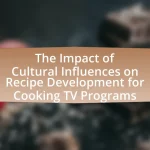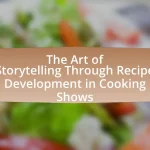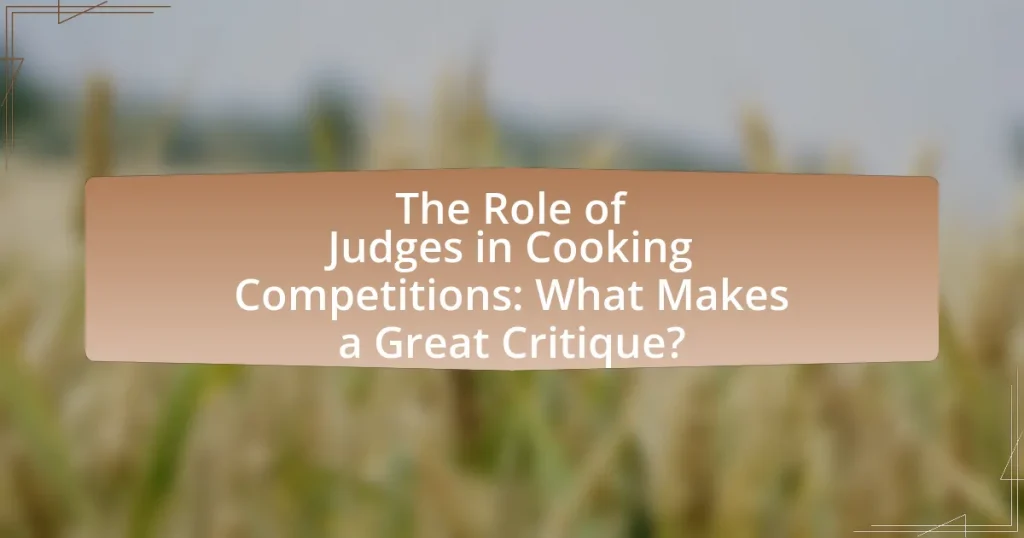The article examines the critical role of judges in cooking competitions, focusing on their evaluation criteria, influence on contestants, and the importance of effective critiques. Judges assess dishes based on taste, presentation, creativity, and adherence to competition themes, providing objective feedback that shapes contestants’ culinary development. The article also addresses the challenges judges face, such as biases and the need for impartiality, while outlining best practices for delivering constructive criticism. Additionally, it highlights the significance of ongoing education for judges to enhance their evaluation skills and maintain the integrity of the judging process.
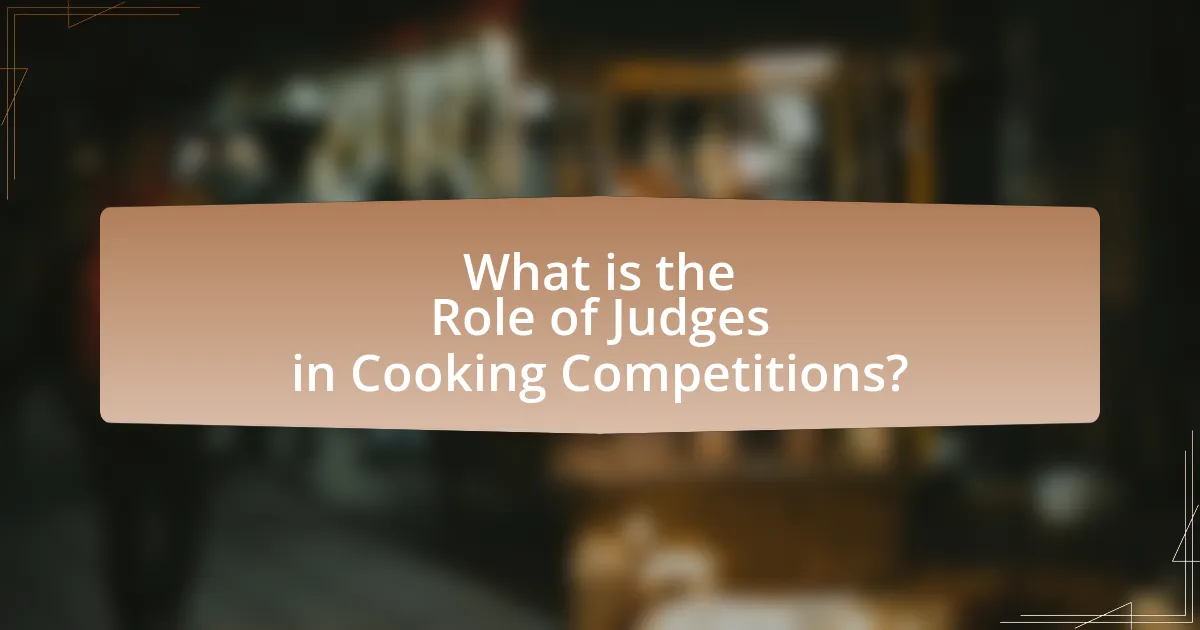
What is the Role of Judges in Cooking Competitions?
Judges in cooking competitions evaluate the dishes prepared by contestants based on specific criteria such as taste, presentation, creativity, and adherence to the competition theme. Their role is crucial as they provide objective assessments that determine the winners and influence the contestants’ reputations. Judges often have culinary expertise or professional experience, which lends credibility to their evaluations. For instance, in competitions like “MasterChef,” judges utilize a standardized scoring system to ensure fairness and transparency in their critiques, reinforcing the importance of their role in maintaining the integrity of the competition.
How do judges influence the outcome of cooking competitions?
Judges influence the outcome of cooking competitions by evaluating dishes based on specific criteria such as taste, presentation, and creativity. Their assessments determine which contestants advance or win, as judges often have the final say in scoring and ranking. For instance, in competitions like “MasterChef,” judges provide feedback that not only impacts immediate results but also shapes contestants’ culinary development. The scoring system used by judges, often a combination of numerical ratings and qualitative comments, directly affects contestants’ standings, making their role crucial in the competitive landscape.
What criteria do judges use to evaluate dishes?
Judges evaluate dishes based on criteria such as taste, presentation, creativity, texture, and adherence to the theme or challenge. Taste is the most critical factor, where judges assess flavor balance and seasoning. Presentation involves the visual appeal and plating of the dish, which can influence the overall impression. Creativity reflects the originality of the dish and the innovative use of ingredients. Texture pertains to the mouthfeel and consistency of the food, ensuring it meets expectations for the type of dish. Adherence to the theme ensures that the dish aligns with the competition’s requirements, demonstrating the contestant’s understanding of the challenge.
How do judges’ backgrounds affect their critiques?
Judges’ backgrounds significantly influence their critiques by shaping their perspectives, preferences, and standards in evaluating culinary creations. For instance, a judge with a classical culinary education may prioritize technique and presentation, while a judge with a background in home cooking might focus more on flavor and comfort. Research indicates that judges’ experiences, such as professional training or cultural influences, directly impact their assessment criteria and feedback styles. This variance in backgrounds leads to diverse critiques, reflecting the judges’ unique culinary philosophies and expectations.
Why is the role of judges crucial in culinary contests?
The role of judges is crucial in culinary contests because they provide objective evaluations that determine the winners based on established criteria. Judges assess various aspects such as taste, presentation, creativity, and technique, ensuring a fair competition. Their expertise and experience in the culinary field lend credibility to the judging process, as they can identify nuances that may not be apparent to the average observer. For instance, professional judges often have backgrounds in culinary arts or food science, which enables them to make informed decisions that reflect industry standards. This structured evaluation process not only maintains the integrity of the contest but also helps aspiring chefs receive constructive feedback, fostering their growth and development in the culinary arts.
What impact do judges have on contestants’ performance?
Judges significantly influence contestants’ performance by providing critical feedback that can enhance skills and confidence. Their evaluations often determine the contestants’ understanding of culinary standards and expectations, which directly impacts their ability to improve and adapt during competitions. Research indicates that constructive criticism from judges can lead to increased motivation and better performance outcomes, as contestants strive to meet the judges’ expectations. For instance, a study published in the Journal of Culinary Education found that participants who received detailed feedback from judges showed a 30% improvement in their cooking techniques over time.
How do judges contribute to the overall competition experience?
Judges contribute to the overall competition experience by providing expert evaluations and constructive feedback that enhance participants’ skills and understanding. Their assessments guide competitors on areas of improvement, ensuring that the judging process is transparent and fair. For instance, judges often have extensive culinary backgrounds, which allows them to offer insights based on industry standards and trends. This expertise not only validates the competitors’ efforts but also educates them on best practices, thereby enriching the learning experience. Furthermore, judges’ interactions with participants can foster a supportive environment, encouraging creativity and innovation in cooking.
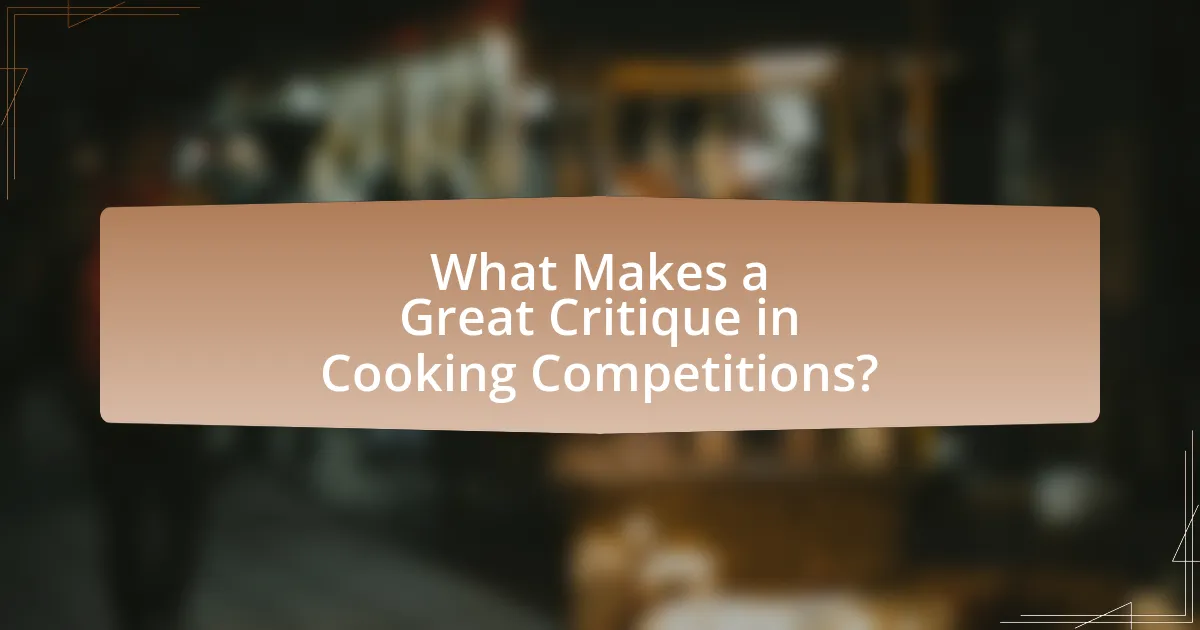
What Makes a Great Critique in Cooking Competitions?
A great critique in cooking competitions is characterized by its clarity, specificity, and constructive feedback. Judges must articulate their observations clearly, focusing on key elements such as flavor balance, presentation, and technique. Specificity is crucial; for instance, instead of saying a dish is “good,” a judge should explain what makes it good, such as the harmonious blend of spices or the perfect doneness of meat. Constructive feedback encourages improvement, guiding contestants on how to enhance their skills. Research indicates that effective critiques can significantly impact a contestant’s learning and growth, as seen in studies on feedback in educational settings, which highlight the importance of actionable insights for skill development.
What qualities define an effective judge’s critique?
An effective judge’s critique is characterized by clarity, constructiveness, and specificity. Clarity ensures that the feedback is easily understood by the participants, allowing them to grasp the strengths and weaknesses of their dishes. Constructiveness focuses on providing actionable suggestions for improvement rather than merely pointing out flaws. Specificity involves detailing particular aspects of the dish, such as flavor balance, presentation, and technique, which helps contestants understand exactly what to enhance. These qualities are essential for fostering growth and learning in cooking competitions, as they guide participants toward refining their culinary skills.
How can judges balance constructive criticism and encouragement?
Judges can balance constructive criticism and encouragement by providing specific feedback that highlights both areas for improvement and strengths in a contestant’s performance. This approach fosters a supportive environment while guiding contestants toward growth. Research indicates that effective feedback combines positive reinforcement with actionable suggestions, which enhances learning and motivation (Hattie & Timperley, 2007). By acknowledging what contestants did well, judges can build confidence, while simultaneously addressing aspects that need refinement, ensuring that critiques are perceived as helpful rather than discouraging.
What role does specificity play in a judge’s feedback?
Specificity in a judge’s feedback is crucial for providing clear, actionable insights to contestants. When judges offer specific comments, they help participants understand exactly what aspects of their performance were successful or need improvement. For instance, instead of saying a dish is “good,” a judge might specify that the seasoning was well-balanced but the presentation lacked color. This level of detail allows contestants to focus on particular areas for enhancement, ultimately fostering their culinary skills. Research indicates that specific feedback is more effective in promoting learning and development than vague comments, as it directs attention to precise elements of performance.
How do judges communicate their critiques to contestants?
Judges communicate their critiques to contestants through verbal feedback during and after the competition. This feedback typically includes specific comments on the contestants’ techniques, presentation, and flavor profiles, allowing contestants to understand their strengths and areas for improvement. For instance, judges may highlight a well-executed dish while pointing out issues such as seasoning or texture, providing actionable insights that contestants can apply in future competitions. This method of communication is essential for fostering growth and learning in a competitive cooking environment.
What methods do judges use to deliver feedback effectively?
Judges in cooking competitions use structured feedback methods, including specific, actionable comments, balanced critiques, and the use of positive reinforcement. These methods ensure that contestants understand both their strengths and areas for improvement. For instance, judges often provide detailed evaluations that highlight particular aspects of a dish, such as flavor balance or presentation, allowing contestants to grasp what worked well and what did not. Research indicates that effective feedback enhances learning and performance, as seen in studies on educational assessments where clear, constructive feedback leads to improved outcomes.
How can judges ensure their critiques are understood by contestants?
Judges can ensure their critiques are understood by contestants by using clear, specific language and providing actionable feedback. Clear language minimizes ambiguity, allowing contestants to grasp the judges’ points without confusion. Specificity in critiques, such as citing particular techniques or ingredients, helps contestants understand exactly what aspects need improvement. Additionally, providing examples of successful practices can illustrate the judges’ points effectively. Research indicates that feedback that is both clear and specific leads to better performance outcomes in competitive settings, as it allows individuals to focus on precise areas for growth.
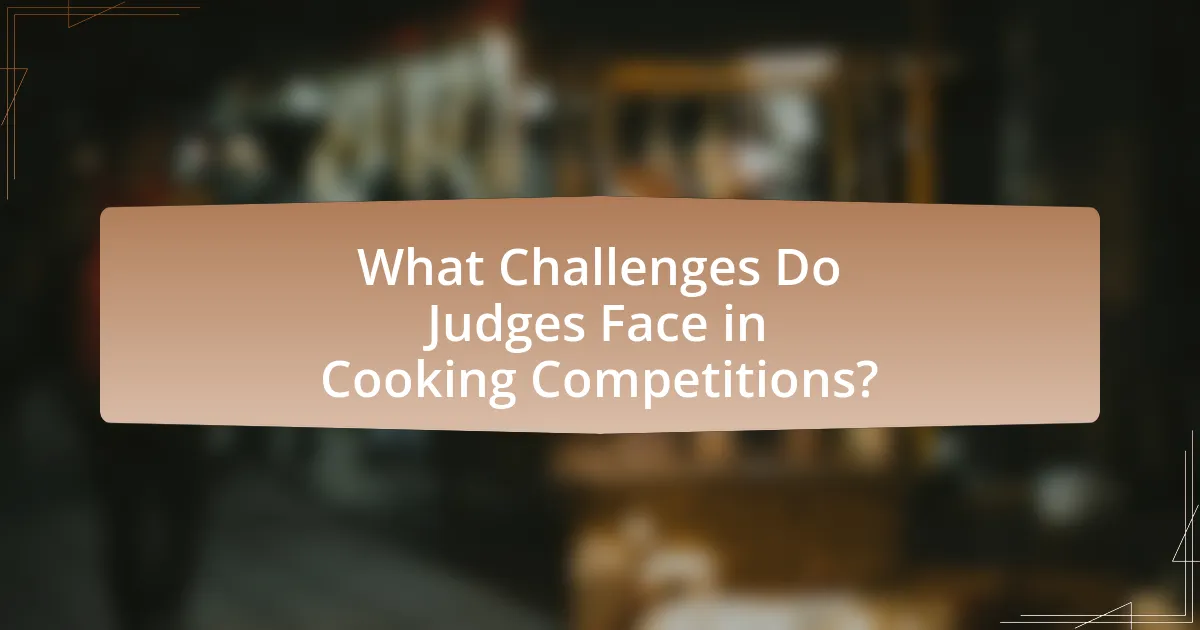
What Challenges Do Judges Face in Cooking Competitions?
Judges in cooking competitions face several challenges, including the need for impartiality, time constraints, and the complexity of evaluating diverse culinary styles. Impartiality is crucial as judges must remain unbiased despite personal preferences, ensuring fair assessments across all contestants. Time constraints often limit the judges’ ability to thoroughly taste and evaluate each dish, which can lead to rushed decisions. Additionally, the complexity of evaluating various culinary techniques and cultural dishes requires judges to possess extensive knowledge and experience, making it difficult to provide consistent and accurate critiques. These challenges highlight the demanding nature of a judge’s role in maintaining fairness and quality in cooking competitions.
What common biases might judges encounter?
Judges in cooking competitions commonly encounter biases such as confirmation bias, halo effect, and cultural bias. Confirmation bias occurs when judges favor information that confirms their pre-existing beliefs about a contestant or dish, potentially skewing their evaluations. The halo effect leads judges to let a contestant’s previous performance or reputation influence their judgment of current dishes, which can overshadow objective assessment. Cultural bias may arise when judges unconsciously favor dishes that align with their own cultural preferences, impacting their ability to fairly evaluate diverse culinary styles. These biases can significantly affect the fairness and accuracy of judging outcomes in competitions.
How can judges mitigate personal biases in their evaluations?
Judges can mitigate personal biases in their evaluations by employing standardized scoring systems and utilizing blind tasting methods. Standardized scoring systems provide objective criteria for assessment, reducing the influence of personal preferences. For instance, using a rubric that focuses on specific elements such as taste, presentation, and creativity allows judges to evaluate dishes based on measurable factors rather than subjective opinions. Blind tasting methods further eliminate bias by concealing the identity of the dishes and their creators, ensuring that judges assess the food solely on its merits. Research indicates that these practices can lead to more consistent and fair evaluations, as evidenced by studies in culinary competitions that show improved scoring accuracy when judges are blinded to contestants’ identities.
What strategies can judges use to remain impartial?
Judges can remain impartial by adhering to strict guidelines and protocols that promote fairness and objectivity. These strategies include establishing clear criteria for evaluation, ensuring transparency in decision-making, and maintaining a professional demeanor throughout the competition. For instance, judges can use standardized scoring systems to minimize personal biases, as evidenced by studies showing that structured evaluations lead to more consistent outcomes. Additionally, judges should avoid personal interactions with contestants outside of the competition context to prevent any perceived favoritism. By implementing these strategies, judges can uphold the integrity of the competition and ensure that all participants are evaluated on equal footing.
How do judges handle disagreements among themselves?
Judges handle disagreements among themselves through structured discussions and deliberations. In cooking competitions, judges often engage in open dialogue to express their differing opinions on contestants’ performances, utilizing criteria established prior to the competition to guide their evaluations. This process may involve revisiting specific aspects of the dishes, such as taste, presentation, and creativity, to reach a consensus. Additionally, judges may refer to established judging guidelines or protocols to ensure fairness and objectivity in their decision-making. This collaborative approach helps maintain the integrity of the judging process and ensures that all perspectives are considered before arriving at a final decision.
What processes are in place for resolving conflicts in judging?
Conflicts in judging are typically resolved through established protocols that include discussion among judges, review of scoring criteria, and, if necessary, consultation with a head judge or competition organizer. These processes ensure that all judges adhere to the same standards and criteria, promoting fairness and consistency in evaluations. For instance, many competitions have a formal appeal process where contestants can request a review of the judges’ decisions, which is often documented in the competition rules. This structured approach helps maintain the integrity of the judging process and addresses any discrepancies effectively.
How can judges maintain professionalism during disputes?
Judges can maintain professionalism during disputes by adhering to established protocols and demonstrating impartiality. This involves following the competition’s rules and guidelines strictly, ensuring that all participants are treated fairly and equitably. Additionally, judges should communicate clearly and respectfully, avoiding personal biases and emotional reactions that could compromise their objectivity. Research indicates that maintaining a calm demeanor and focusing on factual evaluations rather than subjective opinions helps uphold professionalism in high-pressure situations, such as cooking competitions.
What are the best practices for judges in cooking competitions?
Judges in cooking competitions should adhere to best practices that ensure fairness, consistency, and constructive feedback. First, judges must establish clear criteria for evaluation, such as taste, presentation, creativity, and technique, which allows for objective scoring. Research indicates that standardized judging criteria improve the reliability of assessments, as seen in competitions like MasterChef, where judges use specific scoring rubrics.
Second, judges should maintain impartiality by avoiding personal biases and ensuring that all contestants are treated equally. This practice is crucial in competitions to uphold integrity and trust among participants. A study published in the Journal of Culinary Science highlights that unbiased judging leads to higher satisfaction among contestants.
Third, providing constructive feedback is essential. Judges should articulate their critiques clearly, focusing on both strengths and areas for improvement, which helps contestants grow and learn from their experiences. Effective feedback has been shown to enhance skill development, as noted in culinary education research.
Lastly, judges should engage with contestants respectfully and professionally, fostering a positive environment that encourages creativity and innovation. This approach not only enhances the competition experience but also promotes a culture of respect within the culinary community.
How can judges prepare for their role before a competition?
Judges can prepare for their role before a competition by thoroughly reviewing the competition guidelines, criteria for evaluation, and the specific dishes or techniques that will be presented. This preparation ensures that judges understand the expectations and standards required for fair assessment. Additionally, familiarizing themselves with the competitors’ backgrounds and culinary styles can enhance their ability to provide informed critiques. Research indicates that judges who engage in pre-competition preparation are more effective in delivering constructive feedback, as they can reference specific elements of the competitors’ work against established benchmarks.
What ongoing education should judges pursue to improve their critiques?
Judges should pursue ongoing education in culinary arts, sensory evaluation, and effective communication to improve their critiques. Culinary arts courses enhance judges’ understanding of cooking techniques, ingredient interactions, and presentation standards, which are crucial for accurate assessments. Sensory evaluation training equips judges with skills to objectively assess flavors, textures, and aromas, ensuring their critiques are grounded in professional standards. Additionally, workshops on effective communication help judges articulate their feedback constructively, fostering a positive learning environment for contestants. These educational pursuits are supported by industry standards that emphasize the importance of continuous learning for culinary professionals.


